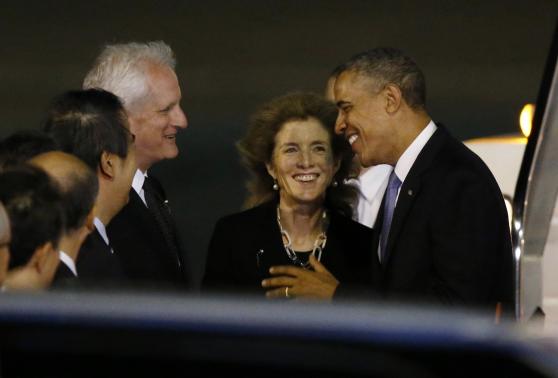
CREDIT: REUTERS/TORU HANAI
U.S. President Barack Obama’s upcoming visit to the Philippines on April 28 highlights Manila’s desire to strengthen bonds with its longtime ally amid rising tensions in the Asia-Pacific region.
The Philippines has said the focus of Obama’s two-day visit in Manila will centre on defence and bilateral cooperation.
Obama is also expected to sign a security pact that will allow for increased use of Philippine bases by U.S. ships, aircraft and troops.
Filipinos, who look to the U.S. as a big brother after decades as an American colony, see Obama’s visit as a reassurance of their commitment to the two nations’ defence treaty, as China flexes its muscles in a territorial dispute in the South China Sea.
“When we consider the capabilities of our military, we do not have enough arms or strength to match China, but if the U.S. is behind us, China will most likely think twice about attacking us,” a production worker Elmer Regada said.
Others say the U.S. is a reliable ally, who will help in times of need.
“For any disaster, for example like typhoons, America is always there for us,” a poker dealer, Don Savit, said.
Some disagree with activists who claim that Obama’s visit reinforces U.S. imperialist motives in the region.
“Other people are saying that Obama’s visit is only serving America’s own interest, but we shouldn’t think that way. We should think that it will also serve our interest. After all, we have no other choice,” accountant Angel Regancho said.
Manila’s acceptance of a beefed-up U.S. military presence, a politically sensitive issue in the independent-minded archipelago nation, would reveal the scale of Philippine anxiety over China, amid a sovereignty dispute over territories in theSouth China Sea.
But Asian allies question whether the U.S. will risk damaging its ties with the world’s second biggest economic power, China, and forced to defend its regional friends against a potential Chinese threat.
For Obama, the tricky part of his Asia swing, which includes stops in Japan, South Korea, Malaysia and the Philippines, will be deciding how to set limits on China in a way that soothes U.S. allies in Asia but avoids stoking tensions with Beijing.
In this tense regional climate, Obama can be expected to appeal directly to Asian leaders to have faith in America’s resolve to keep China in check and discourage any notion that Beijing could emulate Russia’s takeover of Crimea by seizing contested islands and shoals from its neighbours.
While sticking to a U.S. refusal to take sides in the maritime disputes, Obama will seek to reassure South Korea, Japan and the Philippines that Washington is “fully committed to our defense treaties” with them, the official said.
That is not likely to go down well in Beijing, where visiting U.S. Defense SecretaryChuck Hagel faced harsh accusations last week from Chinese officials who claimed that Washington’s regional agenda was aimed at blocking China’s rise.
[Reuters wires]







